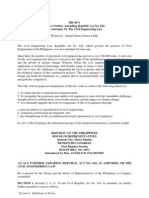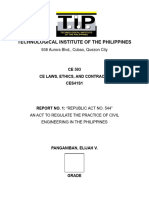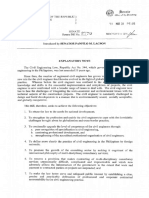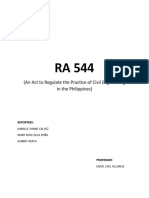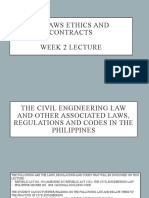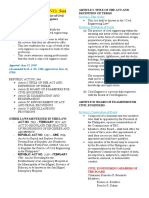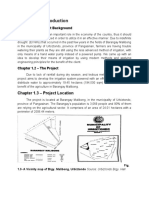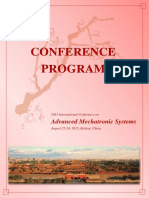Nepomuceno, Vincent Gabrielle R. CE 512 - CE52FA1 Amendments in RA 544
Nepomuceno, Vincent Gabrielle R. CE 512 - CE52FA1 Amendments in RA 544
Uploaded by
Vincent Gabrielle NepomucenoCopyright:
Available Formats
Nepomuceno, Vincent Gabrielle R. CE 512 - CE52FA1 Amendments in RA 544
Nepomuceno, Vincent Gabrielle R. CE 512 - CE52FA1 Amendments in RA 544
Uploaded by
Vincent Gabrielle NepomucenoOriginal Title
Copyright
Available Formats
Share this document
Did you find this document useful?
Is this content inappropriate?
Copyright:
Available Formats
Nepomuceno, Vincent Gabrielle R. CE 512 - CE52FA1 Amendments in RA 544
Nepomuceno, Vincent Gabrielle R. CE 512 - CE52FA1 Amendments in RA 544
Uploaded by
Vincent Gabrielle NepomucenoCopyright:
Available Formats
Nepomuceno, Vincent Gabrielle R.
CE 512 – CE52FA1
Amendments in RA 544
A ranking member of the House of Representatives sees the urgent need to upgrade
the country's civil engineering law to adapt to new challenges in the practice of civil
engineering in the Philippines.
Assistant Minority Leader Aurelio D. Gonzales Jr. (3rd District, Pampanga) filed House
Bill 4456, which amends Republic Act 544 that was enacted on June 17, 1950.
Otherwise known as the Civil Engineering law, RA 544 was amended by RA 1582 on
June 16, 1956.
"RA 1582, which last amended the engineering law about 55 years ago, has a new role
to play in the light of globalization, cross-border practice and climate change," said
Gonzales, himself a licensed civil engineer.
According to Gonzales, HB 4456 seeks to attune the law to national development
needs, strengthen the profession and enable civil engineers, who now number more
than 100,000, to cope with formidable challenges.
"The civil engineer's role used to be confined to the application of technical knowledge
with a broad range of issues to deal with but now, the civil engineer has to face the
challenges of integrating the socio-economic and environmental issue with the technical
aspects of construction projects," Gonzales said.
"The civil engineer is constantly challenged to design and build developments in a
manner that is environmentally sound, socially acceptable and globally competitive,"
Gonzales added.
Gonzales said the formidable challenges to civil engineering spur its professionals to
"continually upgrade the level of competence of civil engineers through peer recognition
of specialization in civil engineering, continuing professional development including
research, and strengthen the accredited professional organization of civil engineers."
Under the bill, the Board of Civil Engineers shall be authorized to administer oaths,
issue, suspend and revoke, investigate violations of the Act and of regulations, issue
subpoenas, inspect educational institutions offering courses in civil engineering at least
once a year, among other things.
The Accredited Professional Organization of Civil Engineers (APOCE) shall replace the
Philippine Institute of Civil Engineers (PICE), which is the official national organization of
all registered civil engineers in the Philippines as accredited by the Professional
Regulation Commission (PRC).
The APOCE's latest edition of the Civil Engineering Code, the manual or the
professional practice of civil engineers and approved by the Board, shall form part of the
implementing rules and regulations.
To encourage the continuing education and development of registered civil engineers,
the APOCE shall be vested by the PRC with the authority conforming to this Act, and
issue a certificate of specialization to a registered civil engineer who has demonstrated
advanced knowledge, experience, education, research and training.
The APOCE shall recognize other specializations and specialists in each branch and
shall have the authority to suspend or revoke a certificate of specialization previously
issued on grounds of violation of any of the provision of this Act.
All registered civil engineers shall take their oath as members of the APOCE. The Board
shall not issue a certificate to any person who is not a member of good standing in the
APOCE.
The House Committee on Civil Service and Professional Regulation chaired by Rep.
Florida Robes (Lone District, San Jose del Monte City) on Wednesday approved three
bills seeking to professionalize Civil Engineering in the country.
Approved were House Bill 3884 authored by Deputy Speaker Evelina Escudero; HB
6836 by Rep. Maximo Rodriguez, Jr. (2nd District, Cagayan de Oro City); and HB 7547
by Rep. Aurelio Gonzales, Jr. (3rd District, Pampanga). The measures seek to amend
and update Republic Act 544 or the Civil Engineering Law.
In her explanatory note of her bill, Escudero said the Civil Engineering Law or Republic
Act 544, which governs the practice of Civil Engineering in the Philippines, was
amended 49 years ago and since then, the role of civil engineers has evolved in the
light of globalization and cross-boarder practice.
She said her bill seeks to make the law attuned to national development needs,
strengthen the profession, and enable civil engineers in the country to cope with the
formidable challenges to become globally competitive, and continually upgrade their
level of competence.
Praxedes Bernardo, Chairperson of the Board of Civil Engineering of the Professional
Regulation Commission (PRC) agreed that RA 544 enacted in 1954 is already outdated.
Bernardo said the law needs amendment to encourage civil engineers to upgrade their
level of competence by obtaining certificates of specialization under the profession.
Bernardo believes that the provisions under the Civil Engineering Law should be revised
so that the scope of the profession can be widened.
The PRC and the Board of Civil Engineering fully supports the three measures,
Bernardo said.
United Architects of the Philippines National President Benjamin Panganiban, Jr. for his
part said that the Integrated and Accredited Professional Organizations of Architects
welcomes proposals to update the Civil Engineering Law in consonance with RA 9266
or the New Architecture Act of 2004 which delineates architecture from civil engineering
and other related professions.
You might also like
- National Design Specification (NDS) For Wood Construction 2018 Edition1651687836919Document206 pagesNational Design Specification (NDS) For Wood Construction 2018 Edition1651687836919priya giri100% (1)
- Career Talk On Engineering For Kids.Document46 pagesCareer Talk On Engineering For Kids.damola2real100% (4)
- R.A 1582Document5 pagesR.A 1582Hayateayasaki1100% (1)
- Eng Ahmed-Cv PDFDocument2 pagesEng Ahmed-Cv PDFAhmed Hassan67% (3)
- July 19.2011 - Amendments To The 55-Year-Old Civil Eng'g Law SoughtDocument2 pagesJuly 19.2011 - Amendments To The 55-Year-Old Civil Eng'g Law Soughtpribhor2No ratings yet
- April01.2015 Bsolons Seek Amendment of Civil Engineering Act To Strengthen ProfessionDocument2 pagesApril01.2015 Bsolons Seek Amendment of Civil Engineering Act To Strengthen Professionpribhor2No ratings yet
- Letter To The Civil Service and Professional Regulations - AttachmentDocument5 pagesLetter To The Civil Service and Professional Regulations - AttachmentRey GabitanNo ratings yet
- AT 1.1 - Report No.1Document14 pagesAT 1.1 - Report No.1Elijah PanganibanNo ratings yet
- Ce593 Report 1Document16 pagesCe593 Report 1Denzel Luna QuiambaoNo ratings yet
- Civil Engineering Law - SB No. 2109 - R A No.544Document5 pagesCivil Engineering Law - SB No. 2109 - R A No.544Ramil Decena LaforteNo ratings yet
- Assignment LaysaDocument6 pagesAssignment LaysaChristian Paul LaysaNo ratings yet
- MODULE 2-CHAPTER 7 R.A. 544-An Act To Regulate The Practice of Civil Engineering in The PhilippinesDocument10 pagesMODULE 2-CHAPTER 7 R.A. 544-An Act To Regulate The Practice of Civil Engineering in The PhilippinesJerichoRoiEspirituTabangNo ratings yet
- Report 1Document18 pagesReport 1MIA NICOLE MACALINONo ratings yet
- Central Luzon State University: Science City of Munoz, Nueva EcijaDocument24 pagesCentral Luzon State University: Science City of Munoz, Nueva EcijaBao yifanNo ratings yet
- Lacson Senate Bill Amending CE Law 544Document17 pagesLacson Senate Bill Amending CE Law 544Edsel Alfred OtaoNo ratings yet
- An Act To Regulate The Practice of Civil Engineering in The PhilippinesDocument8 pagesAn Act To Regulate The Practice of Civil Engineering in The PhilippinesKamilleNo ratings yet
- An Act To Regulate The Practice of Civil Engineering in The PhilippinesDocument5 pagesAn Act To Regulate The Practice of Civil Engineering in The PhilippinesFerly May Zabala VillezaNo ratings yet
- Technological Institute of The Philippines: 938 Aurora Boulevard, Cubao, Quezon CityDocument10 pagesTechnological Institute of The Philippines: 938 Aurora Boulevard, Cubao, Quezon CityJheo TorresNo ratings yet
- Module 1 - CE and Engineering LawsDocument56 pagesModule 1 - CE and Engineering LawsJoefel BessatNo ratings yet
- SBN 753Document5 pagesSBN 753Anonymous oKYlqeLDNo ratings yet
- Learning Module 4 CE 124Document11 pagesLearning Module 4 CE 124Kirby LabadanNo ratings yet
- R.A 544 - Losbanes Bsce 1CDocument7 pagesR.A 544 - Losbanes Bsce 1Clara losbanesNo ratings yet
- Ce Laws Ra 544 Fernandez Jumawan LicantoDocument24 pagesCe Laws Ra 544 Fernandez Jumawan LicantoVERGIE GALVENo ratings yet
- Group 2 ExplanationDocument16 pagesGroup 2 ExplanationFaizal MaligaNo ratings yet
- 5 Code of Ethics of CEDocument3 pages5 Code of Ethics of CESoftware DriveNo ratings yet
- Compiled LecturesDocument121 pagesCompiled LecturesJenirose EndayaNo ratings yet
- The Civil Engineering Law - Republic Act No. 544Document6 pagesThe Civil Engineering Law - Republic Act No. 544aomineNo ratings yet
- Week 2 LectureDocument91 pagesWeek 2 LectureRio Kyla Netzy BaclaanNo ratings yet
- Region XII General Santos City Mindanao State UniversityDocument9 pagesRegion XII General Santos City Mindanao State UniversityMervin BiloyNo ratings yet
- Asst No.2 BautistaDocument6 pagesAsst No.2 BautistaMARK JAMES BAUTISTANo ratings yet
- Republic Act No. 544Document3 pagesRepublic Act No. 544INOJOSA Marc Ezekiel Robin I.No ratings yet
- Central Luzon State University: Science City of Munoz, Nueva EcijaDocument23 pagesCentral Luzon State University: Science City of Munoz, Nueva EcijaBao yifanNo ratings yet
- Reaction Paper 7Document3 pagesReaction Paper 7Mary Ann Toni RasonabeNo ratings yet
- Civil Engineering LawsDocument49 pagesCivil Engineering LawsLorraine Joy JulianNo ratings yet
- RA 1378 Revised - ProposedDocument13 pagesRA 1378 Revised - Proposedjoenhel.villagarcia76No ratings yet
- Code of EthicsDocument17 pagesCode of EthicsDara Faye FajardaNo ratings yet
- Quiz 3 Midterm Garcia MonteraDocument10 pagesQuiz 3 Midterm Garcia MonteraCLAUDILYN JANE LAMPARAS GARCIANo ratings yet
- 4 Module No. 5 - RA 544 Civil Engineering LawDocument7 pages4 Module No. 5 - RA 544 Civil Engineering Lawわたしは 由紀No ratings yet
- Module 4 R.A. 544: AN ACT TO REGULATE THE PRACTICE OF CIVIL ENGINEERING IN THE PHILIPPINESDocument9 pagesModule 4 R.A. 544: AN ACT TO REGULATE THE PRACTICE OF CIVIL ENGINEERING IN THE PHILIPPINESRbcabajes ButalonNo ratings yet
- Group 5 - Ra 544Document26 pagesGroup 5 - Ra 54421-01074No ratings yet
- Section 1. Title of Act. - This Act Shall Be Known As The "CivilDocument8 pagesSection 1. Title of Act. - This Act Shall Be Known As The "CivilPatrickTulayNo ratings yet
- CE195-2 - Civil Engineering Law - JSRDocument17 pagesCE195-2 - Civil Engineering Law - JSRhello whelloNo ratings yet
- Ra 544Document6 pagesRa 544HEILEE KEITHLEEN SERRANONo ratings yet
- Ce 138Document82 pagesCe 138Laiden Mae Taroroc PabatangNo ratings yet
- Summary Report of Republic Act No. 544Document7 pagesSummary Report of Republic Act No. 544JannenNo ratings yet
- CE Laws - RA 544Document9 pagesCE Laws - RA 544Joan Manalo ÜNo ratings yet
- AssignmentDocument42 pagesAssignmentDekuNo ratings yet
- Republic Acts: Click Here For The Latest Philippine Laws, Statutes & CodesDocument7 pagesRepublic Acts: Click Here For The Latest Philippine Laws, Statutes & CodesGerson Nathaniel AruejoNo ratings yet
- Ce LawsDocument20 pagesCe LawsJan HarryNo ratings yet
- C Activity 3 RA 544Document33 pagesC Activity 3 RA 544Aira ChantalNo ratings yet
- Ces Ra 544Document2 pagesCes Ra 5448cxbrtny2vNo ratings yet
- Republic Act No. 544 Congress of The Philippines 17 June 1950Document10 pagesRepublic Act No. 544 Congress of The Philippines 17 June 1950Vlad LipsamNo ratings yet
- Ce Laws CompiDocument231 pagesCe Laws Compijerico pinoNo ratings yet
- CE LAWS ReviewerDocument6 pagesCE LAWS ReviewerlowiebasaregineNo ratings yet
- Pdfcoffee - Com - Ra-544-Ra-545-Civil-Engr-Architecture-1-Pdf-FreeDocument54 pagesPdfcoffee - Com - Ra-544-Ra-545-Civil-Engr-Architecture-1-Pdf-FreeIce BoxNo ratings yet
- AT 1.1 - Report No.3Document19 pagesAT 1.1 - Report No.3Elijah PanganibanNo ratings yet
- Civil Engineering and Society and Other ProfessionsDocument4 pagesCivil Engineering and Society and Other ProfessionsPaul Bronzon DurensNo ratings yet
- Topic 1 Republic Act No 544Document6 pagesTopic 1 Republic Act No 544Mina YoungNo ratings yet
- REPUBLIC ACT NO. 544 (To Be Printed)Document5 pagesREPUBLIC ACT NO. 544 (To Be Printed)Lily QuiNo ratings yet
- Republic Act 544: An Act To Regulate The Practice of Civil Engineering in The PhilippinesDocument7 pagesRepublic Act 544: An Act To Regulate The Practice of Civil Engineering in The PhilippinesLawrence SalazarNo ratings yet
- Lec 6ce2 Ce Law Ethics and Contracts 1Document4 pagesLec 6ce2 Ce Law Ethics and Contracts 1pauloromero138No ratings yet
- CE Laws, Ethics, Codes and StandardsDocument16 pagesCE Laws, Ethics, Codes and StandardsvincentnNo ratings yet
- Bar Review Companion: Labor Laws and Social Legislation: Anvil Law Books Series, #3From EverandBar Review Companion: Labor Laws and Social Legislation: Anvil Law Books Series, #3No ratings yet
- A716!08!2014 Standard Specification For Ductile Iron Culvert PipeDocument5 pagesA716!08!2014 Standard Specification For Ductile Iron Culvert PipeVincent Gabrielle NepomucenoNo ratings yet
- PipePac ManualDocument103 pagesPipePac ManualVincent Gabrielle NepomucenoNo ratings yet
- Appendix B Detailed Calculation For Cantilever WallDocument10 pagesAppendix B Detailed Calculation For Cantilever WallVincent Gabrielle NepomucenoNo ratings yet
- Chapter 3: Constraints, Trade-Offs and Standards 3.1 Design ConstraintsDocument3 pagesChapter 3: Constraints, Trade-Offs and Standards 3.1 Design ConstraintsVincent Gabrielle NepomucenoNo ratings yet
- Local RRL BoholDocument176 pagesLocal RRL BoholVincent Gabrielle NepomucenoNo ratings yet
- Thesis It PancitDocument33 pagesThesis It PancitVincent Gabrielle NepomucenoNo ratings yet
- Assignment 2Document6 pagesAssignment 2Vincent Gabrielle NepomucenoNo ratings yet
- HW 2 Ce LawsDocument6 pagesHW 2 Ce LawsVincent Gabrielle NepomucenoNo ratings yet
- Ground Floor Plan 1 Second Floor Plan 2: Scale 1:150 MTSDocument1 pageGround Floor Plan 1 Second Floor Plan 2: Scale 1:150 MTSVincent Gabrielle NepomucenoNo ratings yet
- Why Are Engineers Considered An Important Segment of The Society?Document2 pagesWhy Are Engineers Considered An Important Segment of The Society?Angellete D. GacayanNo ratings yet
- AACE 2002 Measured MileDocument7 pagesAACE 2002 Measured MilePameswaraNo ratings yet
- 00 Cover WE Rev2Document5 pages00 Cover WE Rev2ariyonodndiNo ratings yet
- IEOMpaper Template-Istanbul2022Document7 pagesIEOMpaper Template-Istanbul2022Jairdan BabacNo ratings yet
- Engineering Ethics and Professional Conduct - CasesDocument13 pagesEngineering Ethics and Professional Conduct - CasesMoses Kaswa100% (1)
- Forensic EngineeringDocument40 pagesForensic Engineeringkk.osain100% (1)
- EngineeringDocument113 pagesEngineeringMohd Qazar YusopNo ratings yet
- Unit IIIDocument27 pagesUnit IIITarun MittalNo ratings yet
- Ajithcv 161215105545Document5 pagesAjithcv 161215105545Arbaaz KhanNo ratings yet
- Iecep By-LawsDocument49 pagesIecep By-Lawsalec salutem50% (2)
- Certified Quality Engineering ManagementDocument3 pagesCertified Quality Engineering ManagementGilt R100% (2)
- Chartered Status: Competent PracticeDocument8 pagesChartered Status: Competent PracticeNg Chee PengNo ratings yet
- Master of Science in Engineering Management (MEM) ProgramDocument9 pagesMaster of Science in Engineering Management (MEM) ProgramAzeddine DjeNo ratings yet
- CE195 2 L5 L6 Engineering PracticeDocument39 pagesCE195 2 L5 L6 Engineering PracticeVictor MirandaNo ratings yet
- How To Make More Money As An Engineer. - Amit Agarwal - LinkedIn (HTTPS://WWW - linkedin.com/Pulse/How-get-raise-Amit-Agarwal)Document20 pagesHow To Make More Money As An Engineer. - Amit Agarwal - LinkedIn (HTTPS://WWW - linkedin.com/Pulse/How-get-raise-Amit-Agarwal)Vijay TeliNo ratings yet
- Pemetaan DK NP NADocument37 pagesPemetaan DK NP NAguntadiNo ratings yet
- 07.1 FE Ethics and Professional Practice 2022Document8 pages07.1 FE Ethics and Professional Practice 2022Robert JDM (Robert John)No ratings yet
- Chapter 1 FinalDocument7 pagesChapter 1 FinalJoel DemegilloNo ratings yet
- Ce195-2: Civil Engineering Law, Contracts, Specification and EthicsDocument13 pagesCe195-2: Civil Engineering Law, Contracts, Specification and EthicsoNo ratings yet
- Mechanical Engineering Internship ResumeDocument7 pagesMechanical Engineering Internship Resumepfbhkvekg100% (1)
- Value Engineering 67319A Sample PagesDocument10 pagesValue Engineering 67319A Sample Pagesaboahmedah8No ratings yet
- GE LAW - RA 8560, As AmendedDocument4 pagesGE LAW - RA 8560, As AmendedJULIUS MIRALONo ratings yet
- ProceedingsDocument656 pagesProceedingsgkgjNo ratings yet
- Application Special Member PDFDocument20 pagesApplication Special Member PDFGelbert SilotNo ratings yet
- LACIP-II ProposalDocument108 pagesLACIP-II ProposalAmmad AlizaiNo ratings yet
- Authors' ProfilesDocument378 pagesAuthors' ProfilesHabib MasumNo ratings yet
- Steel Platform For Equipment ConstructionDocument8 pagesSteel Platform For Equipment ConstructionLloyd MariNo ratings yet






